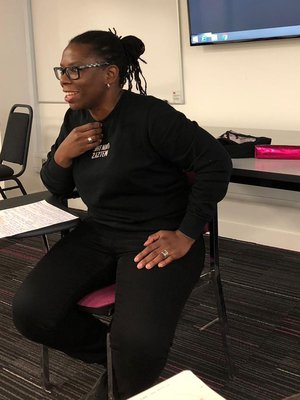In this blog post, Fernanda Vilar, a postdoctoral researcher at the University of Coimbra (Portugal) and a member of the ERC-funded MEMOIRS project, and Inma Álvarez, a member of the Language Acts and Worldmaking project, write about the slam workshop for Modern Language teachers which took place on 30th November 2018 at King’s College London.
Slam is a living poetic practice that takes place at public gatherings where everyone can read, chant, shout, whisper, say, improvise, or recite a text on stage for 3 minutes. The way of presenting the text thus becomes a style peculiar to each person. Someone’s style can change from one text to another or remain the same, and can become more than a style, it can be the signature of the slammer. The poetic form of slam has an artistic and political dimension which allows access to a public speech.
We are reporting here on the slam poetry workshop that was organised by Fernanda Vilar with funding from the 2018 small grants of the Language Acts and Worldmaking project with the support of the Modern Language Centre as part of its training programme.
The main theme was identity and language, linking the event with the Diasporic identities and the politics of language teaching strand of the project. On the one hand, we examined – through the experience of slam creative writing – how this poetry can reveal its deep connections with the way we perceive and transmit memories; and on the other hand, we investigated how it could work as an innovative exercise for second language learning.
Joëlle Sambi, a Belgium-Congolese artist, was invited to lead the slam workshop. For the poet, slam poetry is the pen and the fist at the same time. The word is a weapon; the voice comes to slam the problems of our societies. Usually the subject of the text comes from inside, from the guts, where the emotions are located. Then these are transformed into words by some rhetorical exercises. In this process of finding the right word or the right sound, Joëlle Sambi often uses Lingala language to perform her slam poetry. Even if you can’t understand the meaning of the word, you can feel its power. She presented herself slamming in French and Lingala “et ça c’est très important”.

Joëlle Sambi presenting herself at the workshop
Slam is on the border of literary and discursive genres. It is a blend of verses and performance, a fusion of genres, it can be seen as a laboratory for identity, expression and lexical creativity. It was born from miscegenation and can accommodate different sources of inspiration, codes and languages, and even made up words.
The workshop participants were a group of nine female language teachers from different countries and backgrounds. It was the first time we were working together and having the experience of writing slam poetry as a tool to discover who we are. By developing our slam poems around our names, characters, origins and possessions, and mixing them with words, colours, feelings, body parts and monsters, we also discover a creative means of introducing identity education in the teaching of Modern Languages.
In this workshop we understood how slam can help us to revise the approach to poetry in schools and influence learners’ relationships to language learning. Catherine Brossard expressed afterwards her feelings of her experience through a slam:
Dear Slammer,
It was a pleasure no wonder
To be with you and ponder
Words of beauty and splendour
It was a pleasure
It was a pleasure no wonder
To share a moment of hunger
For words and rhymes no suffer
It was a pleasure
It was a pleasure dear slammer
To surf and rhyme the thunder
Of words and rhymes no gender
It was a pleasure
Cecilia Trevino, another participant, stated: "It was a very useful and relevant workshop which helped us, in a very creative way, to work with writing and oral skills and above all with intercultural awareness. The facilitator Joëlle, was amazing conducting the workshop and I enjoyed her slam poetry very much. And definitely we had a very good time."
Pauline Sithole shared this point of view. She wrote, “thank you for a wonderful and enjoyable workshop. Indeed Joelle's work is superb and I appreciate all the work you as a team put into it. Although I'm not a member of your College I felt very welcome and left considerably more enriched and informed compared to when I walked in. Thank you and wishing all you ladies every success with your poetry. Here's hoping it leaves a 'tangible' (your words) and positive mark in our communities”.
We had very beautiful and quickly produced poetry from the creative exercises proposed by Joelle Sambi. These teachers are now ready to experiment with slam poetry in the Modern Language classrooms, and who knows, the London slam scene may also see them performing on their stages!